
For many of our seniors, continuing to live at home is definitely their preference. For some, it is the home they lived in most of their adult life. It holds happy memories of raising children and entertaining friends and relatives. They know their neighbors. They know the neighborhood. They don’t want to leave. For others, living on their own is their major concern. Where their home is located isn’t as important as the symbol of independence that it represents.
Once it becomes clear that your loved one wants to stay in their own home, the family becomes involved. It may be as the primary caregiver or as a facilitator for arranging in-home care for your loved one. For many families, this becomes more difficult because they live a distance away from their loved one. They won’t have the ability to pop in for a visit to see how their parents are doing. It will be difficult to assess if their needs have changed. The elderly person may try to hide those needs because they fear being pressured to move from their home.
One of the benefits to having elderly home care is they can be the monitors of your senior’s needs for you. In-home care services will allow your seniors freedom to do what they love and have the opportunity to get comfortable with having people come to their home to assist them. It will allow them to develop a relationship with the caregivers.
Another advantage of professional senior care is specialists will evaluate your seniors and their homes to determine what type of assistance your loved ones need or will most benefit from. You may be unaware of some difficulties they are having. In addition, they will assess the home for safety. The specialist will also be able to give you an idea of the tasks a caregiver can help with like:
- Chores
- Errands
- Meals
- Transportation
- Medication
- Personal care
… and a host of additional services to make your senior’s life a little bit easier as they’re getting older. It can also take a great deal of burden off of your family. That being said, any good partnership can come with challenges, and in-home care is no different. The good news is that there are always solutions possible.

Here are some concerns you may have about an in-home care service for your mom or dad, a friend, a relative, or even yourself, and some possible solutions to help handle the situation.
1. Communication between senior, family, and agency.
To this list, add all doctors, therapists, and even the dentist. Everyone needs to know of any changes. Communication is imperative. There are different ways to achieve this. Perhaps a brief text from the caregiver after each visit would be great for the distant family member. Be aware of the person the agency wants you to contact for any medical changes—such as adding new medications or change of dose. A notebook left in the home that various caregivers can write in will prove invaluable to keep them all on the same page about sleep changes, medication changes, wound care, dietary mishaps, and any signs of discomfort or sickness.
If your senior needs physical therapy, where will therapy be given and who will be responsible for it? Will therapy be in-home, or will they need to go to a center? Can you request that care be given by the same caregiver whenever possible? Having the same caregiver helps lower the incidence of a breakdown in communication. They will know your loved one and will quickly pick up on any change in their condition.
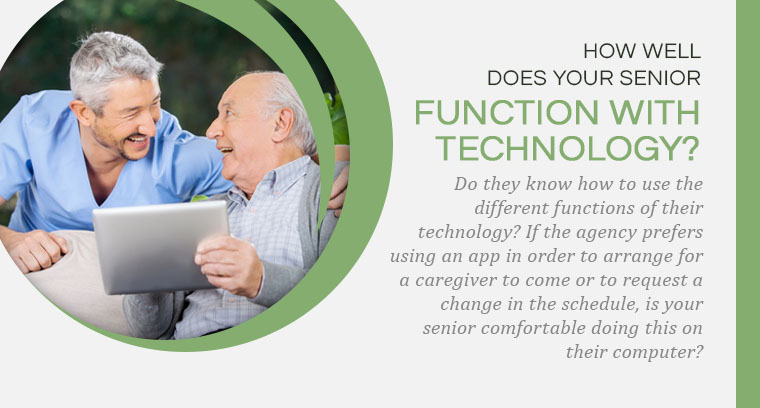
2. Technology.
Technology can be both a benefit and a barrier to good care. How well does your senior function with technology? Do they have a cell phone, a computer, or a digital notebook? Do they know how to use the different functions of their technology? If the agency prefers using an app in order to arrange for a caregiver to come or to request a change in the schedule, is your senior comfortable doing this on their computer? If not, can they do this by phone instead?
The computer or tablet can provide stimulation and fun for your senior. It can be used to learn something new on a particular subject, to view pictures of a specific topic on Pinterest, or to play games. AARP even has a site for brain stimulating games. So, there are many ways that a caregiver can provide entertainment and companionship with the use of the computer or a tablet.
These devices can also be misused by the caregiver. If they are spending most of their time on their cell phone taking personal calls or playing games, that is not acceptable.
Start by asking the agency what their policy is before you hire them. Having a cell phone for emergency calls is acceptable, but any other personal use is inappropriate. If your caregiver is in the home when your loved one typically will be sleeping or napping, you may want to make an exception for those times.
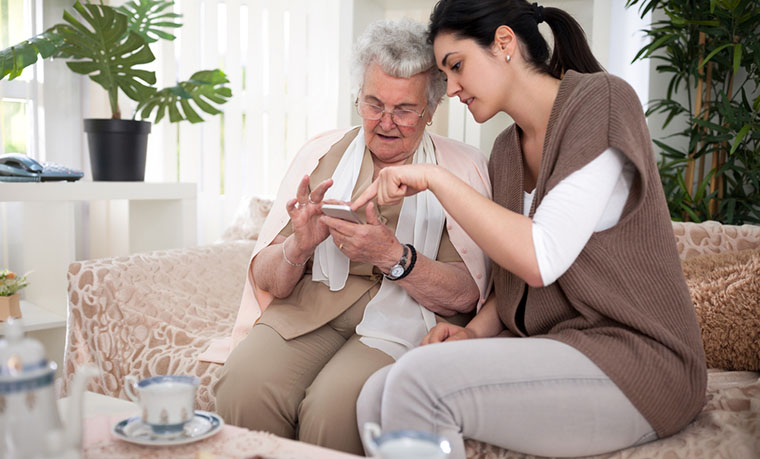
This will be difficult to monitor. Drop in or call on Facetime or Skype at random times. See if it appears they are busy with an activity or project. Ask your loved one how they like having the caregiver and if they like one more than the other and why. This is more difficult to monitor if your loved one has dementia. They may not remember doing things with the caregiver. You will have to rely on your direct observations.
3. Skill Level of Caregiver
When interviewing potential home care agencies, ask what certifications they have and what are the training levels of the caregivers. Do they have additional training in caring for Alzheimer’s or other forms of dementia? Do they offer and require mandatory continuing education for all caregivers?
Be clear about what you will expect from the caregiver. If you want the caregiver to cook meals, and the caregiver can’t seem to boil water, that won’t be a good match and both the caregiver and you will be frustrated.
4. Plan of Care
Draw up a plan of care. Clearly state what you expect of the caregiver on a daily, weekly, and monthly time frame. It should include things like who will take your loved one to the doctor, dentist, or other health care appointments; how often they should be scheduled for a haircut; and who will be responsible. Include things like Mom should go for a walk three times a week or they should go to church every Sunday. The main purpose is to clearly state what you expect and also who will take care of these different tasks.
Also include rules of behavior like no smoking or if they are expected to bring their own lunch or share the lunch they make for your senior. The better you communicate your expectations, the less chance of disappointment and misunderstandings.
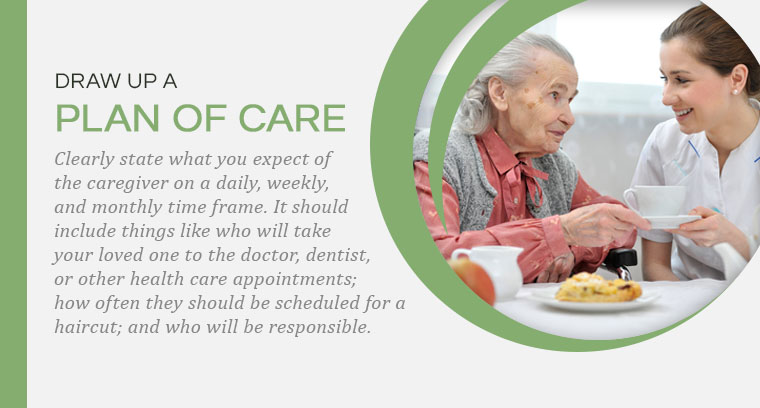
5. Unprofessional Behavior
If your caregiver is always late arriving for her scheduled time or cancels frequently due to being “sick,” it may be time to have a talk with them. It is easy to become friends with the caregiver, especially if you are sharing the caregiving responsibility. You see them often, maybe daily, and they clearly understand the difficulties of caring for your loved one. They can empathize with you and provide a sounding board when you are frustrated.
But friendship can make it more difficult to be the “boss” if the caregiver takes advantage of that friendship. Have a talk with the caregiver and remind her that if she is late arriving at the scheduled time, you will be late for work. Maybe all your caregiver needs is some help with caregiver time management. If that is not effective in changing the negative behavior, then your best recourse is to speak to management of the agency she works through. After all, it is their reputation at stake also.
Perhaps the caregiver can’t be there at the scheduled time because their child’s bus route has changed and they get picked up later than before. It may be a temporary problem that can be resolved, but it may be a permanent issue, and you will have to decide if you want or need to change to a different caregiver. If there are no extenuating circumstances that may excuse the tardiness, then you may not want them as your loved one’s caregiver, as they will probably show their lack of professionalism in other ways, including the quality of care they are providing.
6. Caregiver Frustration or Anger
If your loved one has Alzheimer’s or other forms of dementia, you know how difficult it can be to care for them. Their behavior can be difficult in the extreme. Some become aggressive, while others suffer additional mental disorders such as depression or paranoia. The condition is progressive, so the symptoms are changing.
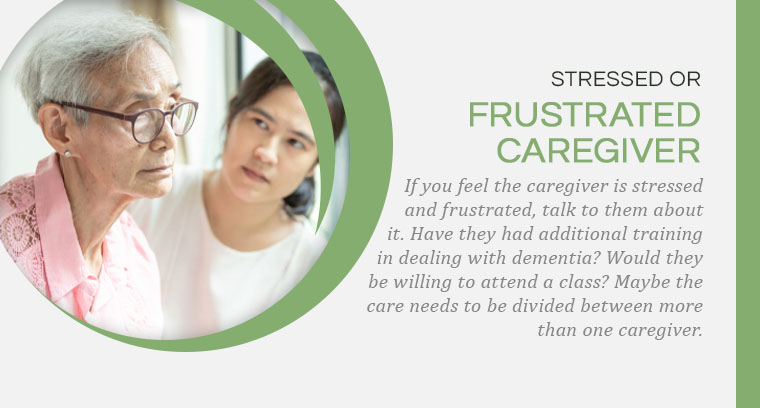
If you feel the caregiver is stressed and frustrated, talk to them about it. Have they had additional training in dealing with dementia? Would they be willing to attend a class? Maybe the care needs to be divided between more than one caregiver. Talk to the agency about a solution.
7. Cost
The cost of care is still a major concern for families of seniors who require it. There is very little financial support available to families for home care. It is important to pursue all avenues of financial support. A good home care agency should be able to assist you with this. By engaging them to assess your senior’s needs, they can help you to decide what amount and type of assistance will be most helpful in your unique situation. This will assure you that you get the most effective home care for each dollar spent.
There is usually a set minimum time that you must have the caregiver for. Usually that will be between 2-4 hours. So, even if your senior only needs assistance getting dressed in the morning, which takes about 15 minutes, you will have to pay for two hours or more. Some services also offer care by the minute. You pay a higher rate for each minute they are providing care, but the time is usually less expensive than paying for two or more hours of care. In other words, ask the agencies you are considering hiring what different options they have for payment.
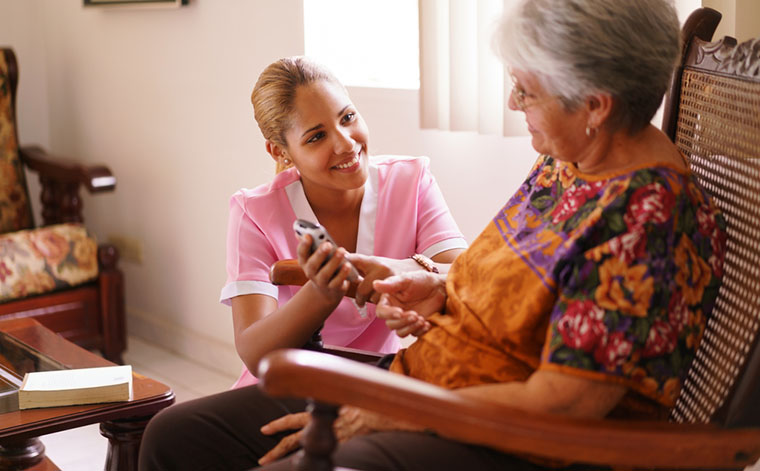
8. Acute Care in the Home
The statistics show that the majority of adults want acute care—care normally provided in a hospital—to be provided in the home setting. This presents its own set of challenges. High-quality medical equipment that is portable and sized for home use may not be available. The caregivers will require a much higher level of specialized training. Of course, reimbursement is always a concern. At this time, in-home acute care is very limited in its availability.
As you can see, the most critical factor in the partnership you will have with your at-home care provider is communication. Make sure that you feel comfortable talking to them and that they are available and eager to discuss the care of your senior at all times. Find the right in-home care option for you and your loved one. You will be in a partnership with them to provide the best care for your loved one.

